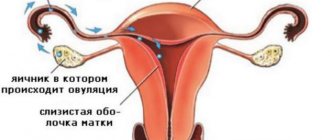Is this normal?
Dark brown discharge is mainly caused by normal processes in the female body and means that the fetal egg has been attached. This phenomenon is called implantation bleeding. But if conception has occurred, then the daub may well indicate that violations have occurred. If you know for sure that you are pregnant and encounter spotting during the period when you usually had your period, this may mean:
- risk of miscarriage;
- ectopic pregnancy;
- fetal freezing;
- hormone failure;
- infections and inflammations;
- diseases of the cervix.
As a conclusion, if you have brown discharge, you need to consult a doctor in a timely manner and, of course, do a test. If the result is positive, you will know that conception has taken place, then you will need to do an ultrasound.
Test negative
If the test shows only one line, do not reassure yourself that everything is in order.
In case of an ectopic pregnancy, the test may also be negative, so you should not hesitate and you should visit a gynecologist. The body responds to an ectopic pregnancy by producing the hormones it needs. But the fertilized egg is fixed in the fallopian tube, which does not have the ability to stretch. Why then does it smear instead of menstruation? This is not actually menstrual flow. The fetus develops and increases in size, damaging the fallopian tube, causing black discharge to appear. Spotting can continue not only during so-called menstruation, but also after it.
In addition to scanty discharge, during an ectopic pregnancy, cyclical pain in the lower abdomen is observed and symptoms of toxicosis may appear. A regular pregnancy test will most often be negative in the early stages. The presence of an ectopic pregnancy can only be 100% verified using the hCG test. An ectopic pregnancy is life-threatening and should be taken very seriously.
Why does spotting appear?
During pregnancy, brown discharge occurs due to a lack of progesterone coupled with muscle hypertonicity. It is important to take action in time, then the daub will stop. If we talk about implantation bleeding as a phenomenon, then it is often one of the early symptoms of pregnancy. Even in the absence of a delay, such discharge will indicate a likely past conception. First, the egg unites with the sperm and a fetal egg is formed, then it penetrates the uterine mucosa and, finally, during this, small vessels are damaged, which causes the coagulation of drops of blood and the appearance of brown discharge. Therefore, if the daub meant pregnancy, then it will go away on its own in a few days. In other cases, as mentioned above, you should definitely visit a gynecologist.
Alarming symptoms of spotting instead of menstruation
The appearance of spotting should be considered an alarming symptom that requires urgent consultation with a gynecologist. Most often, such bleeding phenomena are accompanied by various signs, which can give the doctor an idea about a specific pathology and be a reason to prescribe additional studies.
Thus, if a woman experiences spotting, which is accompanied by similar complaints, it is worth considering consulting a specialist:
- Bleeding occurs during pregnancy. Usually in the early stages this is a sign of a threat of spontaneous abortion. Most often, such spotting is observed at the onset of the next menstruation after fertilization. Unfortunately, many women perceive this process as normal periods. In late gestation, with the concomitant development of abdominal pain, this is a sign of premature placental abruption. In any case, these processes are a direct threat to a normal pregnancy and the risk of its termination.
- Spotting that occurs regularly between menstruation. This symptom indicates that a woman has a pathology of the reproductive system. It is difficult to say just by the presence of smears what kind of disease we are talking about. However, these can be either tumor processes (fibroids, cervical cancer, etc.), or endometriosis, atrophic vaginitis, etc.
- The daub is dark red, brown, chocolate in nature. This symptom is typical for a disease such as endometriosis.
In any case, when prolonged bleeding outside of menstruation is observed in a woman, regardless of the underlying cause of the symptom, the process can lead to significant blood loss.
As a result, chronic anemia develops, which can cause weakness, nausea, pallor and a number of other symptoms of this disease.
Spotting for threatened miscarriage
With an incomplete miscarriage, brown discharge also occurs, but in this case it becomes bloody and includes clots. You will also feel cramps in the lower abdomen and pain.
In the case of a frozen pregnancy, menstruation is delayed and bleeding occurs, accompanied by abdominal pain. It is enough to donate blood for hCG and do an ultrasound to confirm or refute the death of the fetus in the womb. Here are the reasons why threats of miscarriage may arise:
- there is not enough progesterone in the body;
- there are diseases of the endocrine system;
- there are problems with the pituitary gland;
- the body is exposed to stress;
- excess physical activity;
- bad habits (smoking, alcohol and drugs).
If you do not consult a doctor in time if there is a threat of miscarriage, you will lose your baby and also risk having to have a curettage.
How to deal with it
You can start diagnosing the causes of scanty discharge yourself. A woman can take a rapid pregnancy test. But in the absence of a delay, when the concentration of hCG in the blood is still insufficient, the test may be negative. Then a blood test for hCG will help.
If you are convinced of the presence of pregnancy, you need to decide on its preservation. Spotting as a sign of a threat of interruption requires the prescription of progesterone drugs Duphaston or Utrozhestan. Reviews about this treatment are positive: with timely correction of hormonal levels, a woman has the opportunity to bear a baby. The course of treatment lasts until the placenta forms, when it independently begins to produce progesterone.
Medical tactics in other cases are determined by the diagnostic result. In case of infection, a course of antibiotic therapy is required. Hormonal imbalances are corrected depending on the causes of the failure. If there are endocrine pathologies, then joint treatment with an endocrinologist of the underlying disease is necessary.
A woman's reproductive health determines her lifestyle. Heavy physical activity can also lead to spotting instead of menstruation. This condition is typical for professional athletes. But in ordinary life, a change in the nature of the discharge should be alarming if it is not a sign of approaching menopause.
Brown discharge during ectopic pregnancy
The implantation of the embryo occurs from the third to the seventh day after the rupture of the follicle. If it is attached already on the first or second day, there is a possibility of an ectopic pregnancy, which cannot be carried to term. And then urgent medical attention is needed, otherwise you may lose the opportunity to have children in the future, and there is a risk of death. These signs can help identify an ectopic pregnancy:
- pain in the abdominal area;
- weakly positive test result;
- Ultrasound does not demonstrate the presence of a fetal egg in the uterus;
- HCG in the blood is increased;
- bleeding from the vagina occurs;
- blood pressure is below normal;
- my head is spinning.
In particularly severe cases, you may even lose consciousness due to severe blood loss.
Pregnancy
This is one of the common causes of spotting instead of menstruation. This may be due to several reasons.
Among them, the most common are ectopic pregnancy and the threat of spontaneous miscarriage, as well as hormonal insufficiency of the second phase of the cycle during the fertilization process.
In the first case, the daub is characterized by the fact that it can occur against the background of a slight delay. A woman may characterize it as normal menstruation, but in its characteristics it will differ from it in the volume and nature of the discharge.
Typically, this is a small amount of brown discharge from the genital tract. In this case, instead of menstruation, spotting will be accompanied by pain, occurring mainly on the affected side.
In the event of a threat of spontaneous miscarriage, spotting also begins to appear after a delay, but on any day, regardless of the date of expected arrival. Most often it is accompanied by the appearance of nagging pain in the lower abdomen, a feeling of malaise and general weakness. In this case, the spotting is associated not with the arrival of menstruation, but with the detachment of the fertilized egg.
Insufficiency of the second phase of the menstrual cycle can be expressed in a woman even after the actual event of fertilization. But on the day of the expected menstruation, a woman may experience spotting. This is due to insufficient formation of the endometrium to prepare for pregnancy.
Uterine erosion and spotting
If a pregnant woman has cervical erosion, a woman may occasionally experience slight vaginal discharge. The reason is that the eroded area is irritated and damaged during the growth of the uterus and stretching of the cervical canal. In this case, it is also recommended to be observed by a specialist.
In case of erosion, spotting may occur even in the absence of pregnancy. For example, it is often caused by mechanical trauma during sexual intercourse or during examination by a doctor. And if it appears due to inflammation of the endometrium, you will find brown discharge before the start of your period.
Discharge after childbirth
Usually, young mothers, out of ignorance, begin to panic that after giving birth they bleed for a long period . This happens for the reasons that:
- A woman is breastfeeding.
- The more often the baby suckles, the more discharge there will be.
- The discharge of blood from the vagina depends on how the birth went.
Those who have recently had an abortion will also have spotting, due to the fact that a temporary hormonal imbalance occurs, and usually everything goes away on the third day
In any case, you should not ignore any discharge in order to prevent serious consequences.
Brown discharge not due to pregnancy
Spotting may not always indicate fertilization. So you shouldn’t make hasty conclusions, because one of the reasons could be:
- inflammatory process;
- hormone surges;
- polyps;
- cervical erosion;
- violation of oral contraceptives.
Finally, irregularities in the menstrual cycle and the appearance of brown discharge are normal for the first few periods in life. If there are no other symptoms, then this is completely normal. Brown spotting often occurs due to endometriosis and hyperplasia, inflammatory processes (for example, adnexitis and endometritis), and polyposis. Doctors associate the occurrence of polyps with exposure to the human papilloma virus. With this disease, women have long and heavy periods, and the growths themselves are located in the uterus or cervical canal.
There are also causes of brown spotting, such as sexually transmitted diseases and damage to the genital organs. You can suspect a sexually transmitted disease based on symptoms such as itching, burning and unpleasant odors from the genitals.
Treatment
Treatment methods are directly related to the causes of brown discharge. If this is a symptom of some disease, then it is unlikely to do without antibiotics, hormonal therapy and anti-inflammatory drugs. When the cause of this phenomenon is polyps, then in extreme cases, in addition to drug therapy, scraping is indicated.
If hormonal contraceptives are the cause of the spotting, then you should stop taking them and adhere to another method of protection against unwanted pregnancy. Or the doctor should prescribe other oral contraceptives. When menopause is a factor in the occurrence of brown masses, doctors recommend treatment only with hormonal drugs. But other symptoms can also reveal this condition: hot flashes, mood changes, fatigue.
However, such hormonal imbalances can be overcome using traditional medicine methods. But they can only be used after consultation with a doctor. One effective recipe is the following:
- Using a meat grinder, turn the lemon and orange into porridge.
- Add 2 tablespoons of sugar and onion tincture to the citrus fruits.
- Take a teaspoon three times a day for a week.
What to do if you have brown discharge instead of your period?
If you are faced with spotting and it does not go away in two or three days, and is also not a sign of the first menstruation or the upcoming menopause, then this is a reason to contact a gynecologist. First, the doctor will interview you, then examine you and, most likely, refer you for an ultrasound or other examinations. The most reliable option is microbiological tests, namely a smear. It is taken from the vagina and cervix to understand what caused the spotting. In severe cases of the disease, women are referred for laparoscopy to make an accurate diagnosis. Here's what experts recommend:
- use white pads or underwear during pregnancy to see discharge in time;
- refuse tight artificial underwear;
- try not to disturb the vaginal microflora when washing and not to cause infections;
- Save the drainage pad to ask your doctor for advice.
And remember that only a gynecologist will say for sure whether spotting is a sign of pregnancy or is caused by other reasons.
Reasons for the appearance of brown ointment instead of discharge
The appearance of brown discharge instead of menstruation can occur for various reasons. But in order to understand why this happened, you need to consider the following factors:
- woman's age;
- sexual activity;
- presence of surgery or pregnancy;
- presence of diseases;
- external factors (changes in climate, lifestyle, diet, stress, taking medications, severe physical activity).
If brown discharge appears instead of menstruation in the first year of menstruation, this is normal. Very often girls 14-15 years old worry about this. But do not panic, since the cycle at this age is just being established. But if this continues for more than six months every month, you need to consult a gynecologist.
Brown discharge instead of menstruation may be the first sign of menopause, during which the ovaries stop working and hormonal levels decrease. This phenomenon occurs in women 45-50 years old. For those women who are regularly sexually active, the following phenomena may be the causes of such masses:
- pregnancy;
- abortion;
- miscarriage;
- hormonal imbalances;
- taking contraceptives;
- sexually transmitted diseases.
If a woman does not protect herself during sexual intercourse, with the hope of becoming pregnant, then on the long-awaited days of her period, light brown discharge may appear, which indicates hormonal imbalances in the body. But usually after them blood clots appear within a few days. If this does not happen, it is recommended to take a pregnancy test, since this phenomenon may indicate fetal implantation. If the test shows a positive result and menstruation appears, you need to contact a gynecologist, since this symptom may indicate a lack of hormones for the development of the embryo. Another cause of brown discharge is ectopic pregnancy. If the test is negative, then you should also see a doctor.
Often, when taking various contraceptives, there is a decrease in ovarian function, the main symptom of which is spotting brown masses. These phenomena should alert the woman, and she should contact a gynecologist to select new medications. If, in addition to brown discharge, instead of menstruation, the following symptoms appear:
- painful sensations after sexual intercourse;
- itching of the perineum;
- pain when urinating;
- lower abdomen hurts.
you need to see a doctor and undergo an examination, since these signs indicate the presence of sexually transmitted diseases: syphilis, gonorrhea, chlamydia.











